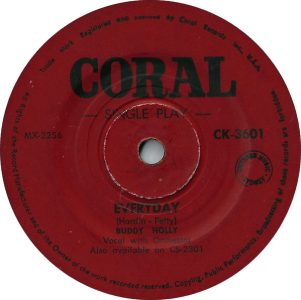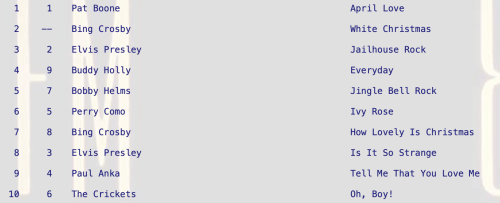#114: Everyday by Buddy Holly
City: Ottawa, ON
Radio Station: CFRA
Peak Month: December 1957
Peak Position in Ottawa ~ #4
Peak position in Vancouver ~ did not chart
Peak Position on Cashbox Top 100 Singles ~ #51
YouTube: “Everyday”
Lyrics: “Everyday”
In 1936, Charles Hardin Holley was born in Lubbock, Texas. When he was five years old he won $5 when he entered a local talent show and sang “Down The River of Memories.” He listened to the Grand Ole Opry growing up and after trying to learn the piano settled on taking up the guitar. During his Junior and Senior years in school, Holley entered some talent shows with friends in duos and doing gigs with a band playing a blend of country & western and rhythm & blues. He had a band that performed live on the Lubbock radio station KDAV. After high school graduation Holly focused on making a career as a musician. He heard Elvis Presley in concert in Lubbock in 1955. Shortly after Hollry would appear as the opening act for Presley in concert three times in 1955. Owen Bradley, who would also produce records for Conway Twitty, Brenda Lee, Patsy Cline and Gene Vincent, became Holley’s record producer after he signed a record deal with Decca Records in February 1956. After signing the record deal, Buddy Holley dropped the “e” from his surname to become Buddy Holly.
Initially, Holly was not satisfied with the progress he was making with Decca Records. In May of 1957 he and his band sent a demo of That’ll Be the Day to Brunswick Records in New York City, under the name The Crickets. The label decided to release the record and it went on to be a big hit. The Crickets became a rock ‘n roll/rockabilly group in 1957. They are credited with influencing a whole range of recording artists including Bruce Springsteen, Bob Dylan, the Rolling Stones and the Beatles. In fact, the Beatles got the idea for their name as a riff off of another insect, cricket, just going up one letter of the alphabet from C to B for Beatles. Paul McCartney once told the press, “If it wasn’t for the Crickets, there wouldn’t be any Beatles.”The Crickets were initially the backing band for Buddy Holly and among their hits are “That’ll Be The Day”, Peggy Sue”, “Oh Boy”, “Not Fade Away”, “Maybe Baby”, “It’s So Easy” and “Rave On”.
The followup to “That’ll Be The Day” which was a number-one hit, was “Peggy Sue”. It reached #3 on the Billboard pop chart and #2 on the Cashbox Best Selling Singles chart. The B-side to “Peggy Sue” was “Everyday”.

The Crickets were not credited on the recording of “Everyday”. However, they were all in the recording studio with Buddy Holly for the song. “Everyday” is an upbeat song that finds Holly in a hopeful mien, sure that he will soon land the girl of his dreams. The song is credited as being written by Charles Hardin and Norman Petty. Charles Hardin is actually Buddy Holly: his real name was Charles Hardin Holley.
Petty was born in Clovis, New Mexico, in 1927. After serving in the United States Army in from 1945-48, Petty worked as a recording engineer in a studio in Dallas. In 1954 he teamed up with his wife Vi, and guitarist Jack Vaughan, to record “Mood Indigo”. The single sold over half a million copies and climbed to #14 on the Hit Parade in 1954. Meanwhile, he began to build his own recording studio that year which opened in 1957. He recorded sessions for Roy Orbison, Buddy Knox, Waylon Jennings, Jimmy Gilmer & The Fireballs “Sugar Shack”, Jimmy Bowen, Trini Lopez and “Wheels” by the String-A-Longs. Petty also co-wrote several songs recorded by Buddy Holly. In addition to “Everyday”, Petty co-wrote “That’ll Be The Day”, “Oh Boy!“, “Not Fade Away”, “It’s So Easy“, “Heartbeat”, “I’m Gonna Love You Too“, “Rave On“, “Maybe Baby”, “Peggy Sue” and “True Love Ways”.
Featured musicians at Norman Petty’s studio in New Mexico included Glen Campbell, “Jim” Seals and “Dash” Crofts, J.D. Souther, Johnny Duncan and others. He produced records for Canadian pop musicians Wes Dakus and Barry Allen, as well as British Invasion band The Tremeloes. Early in the summer of 1958, both Holly and his fiancee María Elena Santiago visited the studio in Clovis (NM) telling Norman Petty they wanted to end the contractual relationship. Petty was accused of “withholding royalties” from Holly. Before he died, Buddy Holly learned that the band’s “recording royalties had not been banked under the bands name (and account) but under Petty’s.” Norman and Vi Petty were not invited to attend the August 15, 1958 wedding of Buddy Holly to María Elena in Lubbock (TX). Norman Petty died at the age of 57 of leukemia in 1984.
In 1999, Holly’s widow, Maria Elena, along with Holly’s siblings, filed a lawsuit against MCA Inc. in which she alleged that Petty “conspired with MCA to defraud the Holly heirs.” It was eventually determined through extensive auditing that “MCA owed the Petty estate and the Holly heirs a combined $251,325 in additional royalties.
“Everyday” peaked at #2 in Toronto, #4 in Ottawa, LaCrosse (WI), and Houston, #5 in Albany (NY), Prichard (AL), Burlington (VT), and Troy (NY), #9 in Worcester (MA), and Portland (OR), #10 in Charleston (WV), and #12 in Woonsocket (RI).
Buddy Holly’s version of “Everyday” never cracked the Billboard pop charts. However, both James Taylor and John Denver had minor hits with the song. Holly’s version of “Everyday” was featured in the soundtrack for the 1986 film Stand By Me starring River Phoenix and Richard Dreyfuss.
From April 1957 to January 1958, Holly returned on a number of occasions to record tracks for his second album, self-titled Buddy Holly. Among the tracks he recorded was a song written by the songwriting team Jerry Leiber and Mike Stoller called “You’re So Square (Baby I don’t Care)”. The song was recorded by Elvis Presley in 1956. In Holly’s case, “You’re So Square (Baby I Don’t Care)” remained a non-single track following the 1958 release of the Buddy Holly album. Then Holly died in a plane crash on February 3, 1959, along with Ritchie Valens and the Big Bopper (J. P. Richardson). Dion DiMucci would have been a fourth fatality, but he decided not to take the flight since it cost $36.
Numbers of Holly’s songs became hits after his death including “It Doesn’t Matter Anymore” and “Raining in My Heart.” Holly had ongoing appeal in England where his recordings of “True Love Ways” and “Brown Eyed Handsome Man” charted into the Top 5 of the UK charts in 1963.
In 1978, a film, The Buddy Holly Story, was released. In 1986, Buddy Holly was inducted into the Rock and Roll Hall of Fame. In 1989, in the theatre district of London, there was a premiere of the musical Buddy: The Buddy Holly Story. The show had a subsequent run on Broadway the following year. In 2004, a film titled The Real Buddy Holly Story was released. It was created in response to what several members of The Crickets felt were misleading details in the 1978 film, The Buddy Holly Story.
September 17, 2025
Ray McGinnis
References:
Buddy Holly bio, Rolling Stone, New York, NY.
“Buddy Holly’s Widow Sues Mca For Royalties,” Dallas Morning News, May 29, 1999.
Buddy Holly: Rock & Roll as we Know it Wouldn’t Exist Without Buddy Holly, Rock and Roll Hall of Fame, 1986.
Norman, Philip. Rave On: The Biography of Buddy Holly. Simon & Schuster, New York, 2014.
Norman, Philip, Buddy: The Definitive Biography of Buddy Holly, Pan Books, London, 2009, 252-253.
Philip Norman, “Why Buddy Holly Will Never Fade Away,” Telegraph, London, February 3, 2015.
Spence, Richard (Director). The Real Buddy Holly Story. Universal Music Canada, 2004.
William Kerns, “Blanas includes decline of Petty-Holly friendship in ‘King of Clovis’,” Lubbock-Avalanche Journal, July 12, 2014.
“Buddy Holly’s manager dead at 57,” UPI, August 16, 1984.

CFRA 580-AM Ottawa Top Ten | December 21, 1957

This is one of my favorite Buddy Holly records. Hard to believe it never made the Billboard Charts, nor the CHUM chart in Toronto.
Hi Tom, it’s a surprise given the airplay it’s received in the decades that have followed. Ray